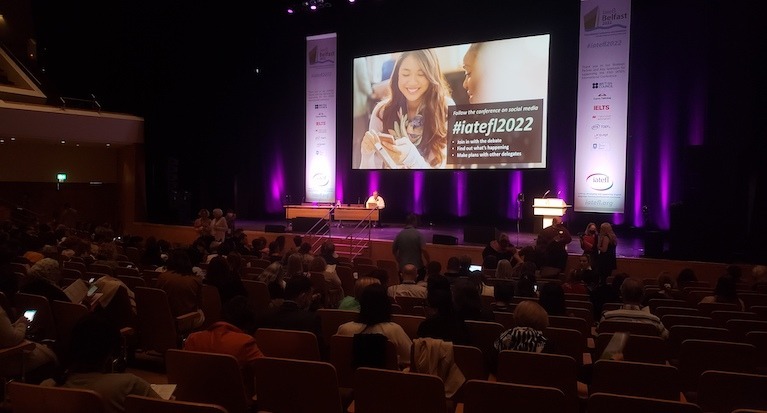Everyone eagerly put real faces to names they knew only from Zoom calls or Linkedin.
Walking into the hall of the 55th International Association of Teachers of English as a Foreign Language conference, it was impossible not to think about the state of the ELT industry.
The past few years, with an assist from a worldwide pandemic, have been full of dynamic shifts and tension points. In-person vs. e-learning instruction, language schools vs. tutor marketplaces, native speakerism, neo-colonialism, the collapse of the Chinese e-tutoring market, sustainability and climate change, the war in Ukraine — all of these issues swarmed through my head as I made my way to Belfast.
This was the first in-person IATEFL since 2019. The atmosphere was tentative but cheerful. Everyone eagerly put real faces to names they knew only from Zoom calls or Linkedin.
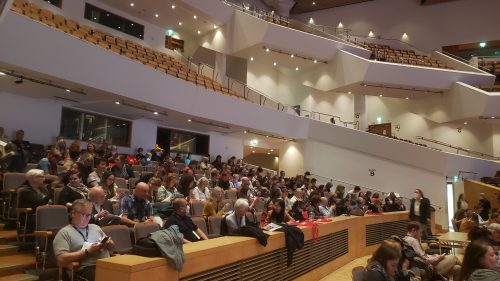
Over the four days of IATEFL and an additional pre-conference day, rowdy EL teachers and professionals invaded Belfast. Each day started with a plenary session on the most important issues facing the industry today. After the plenary, speakers from all over the world presented at over 150 academic sessions along with pop-up presentations.
Day | Speakers | Plenary |
1 | Dr. Nayr Ibrahim | (Re)imagining and (re)inventing early English language learning and teaching |
2 | IATEFL President: Gabriel Diaz Maggioli | Reading the Word and the World |
3 | Professor Libor Štěpánek | EMI: A language teacher's leap into the unknown? |
4 | Teachers: Asmaa AbuMezied and Hansa AbuMezied | Education, English and the question of future in conflict areas |
After a whirlwind of visiting exhibition booths, academic sessions and networking, here are some highlights and thoughts about IATEFL 2022.
Future Trends
Here are the trends which were most prevalent at IATEFL this year.
More recognition for teaching English to Young Learners (YLT)
YLT professionals were out in force at the conference this year. The first plenary session by Dr. Ibrahim gave recognition to YLT as a unique and essential part of the industry.
“We need to teach the whole child, not just the language.” – Dr. Ibrahim
I spoke to one YL teacher who said it was incredibly gratifying to see their field recognized as important and not secondary to teaching adults. This might sound strange to some teachers who taught online in the past. Many online tutoring companies like VIPKid Global and Cambly Kids focus solely on young learners, but in the UK context, most language schools, with the exception of summer camps, teach mainly adults. They also require a CELTA (originally the Certificate in English Language Teaching to Adults, now a different name) which focuses on teaching adults not young learners.
In addition to an emphasis on YL teachers, Dr. Ibrahim also suggested a more playful and experiential approach to teaching young learners. “We need to teach the whole child,” Dr. Ibrahim said, “not just the language.”
More recognition for English as Medium of Instruction (EMI) and Content Language Integrated Learning (CLIL)
Along with the plenary on EMI, the number of European, African and South American academics was evidence that EMI is very important for IATEFL and the world as a whole.
A professor from Germany said he really appreciated Libor Štěpánek’s plenary and how good it felt to be reminded he isn’t an English language teacher but rather an expert who happens to teach in English.
There was more excitement around CLIL with many teachers attending presentations like “Speaking activities to promote oral confidence in CLIL classes” or “CLIL: from language to the integration of content and language.” It seems EL teachers are realizing how engaging CLIL can be and how much of a confidence boost students get from it.
More diversity and acceptance of global English
“Creative teams must be diverse.” – Ben Goldstein
The diversity of speakers was a great sign for global English. For many attendees and professionals, English was their L2.
One tension point was the teaching of connective speech. Connective speech is something L1 English speakers do without thinking about it, but L2 speakers tend not to do this. This led Mark Hancock, in his presentation, Say It to Hear It, to be at odds with Marek Kiczowiek, author and ELT advocate against native-speakerism. Hancock advised teaching connective speech for students to better understand how many English speakers express themselves even though as he said, “some like Marek Kiczowiek would disagree.” Kiczowiek has argued that some features of connective speech are unhelpful for global English. While almost everyone at IATEFL appeared to be in agreement against Native Speakerism, there are still issues like the teaching of connective speech which have yet to be resolved.
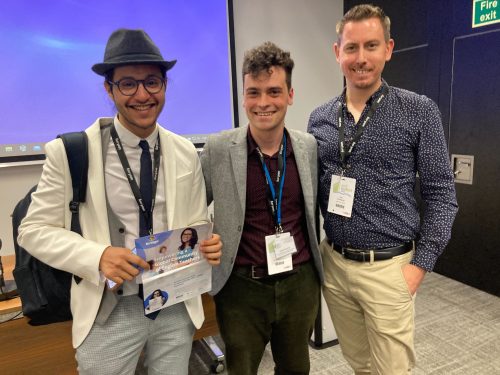
One talk, “Mainstreaming” Diverse Voices through Video, showed off a Vlogger Academy with speakers who were openly members of LGBTQ+ communities. It was a refreshing change from the sterile approach many ELT books and online courses usually take. Speaker Ben Goldstein emphasized that it’s not just characters in teaching materials that must be diverse but that “creative teams must be diverse” as well.
More acceptance and use of e-learning, including teacher training
One of the only good things to come out of COVID is the more ready acceptance of e-learning as not only an alternative to in-person learning but also better in some ways than in-person learning.
Bridge’s own Anna Hearrell along with NILE’s Johanna Stirling had an enlightening talk about how and why online teacher training is effective and well adapted to teachers’ needs. In particular, the talk dispelled the myth that online training doesn’t work while also acknowledging the difficulties that can come with e-learning.
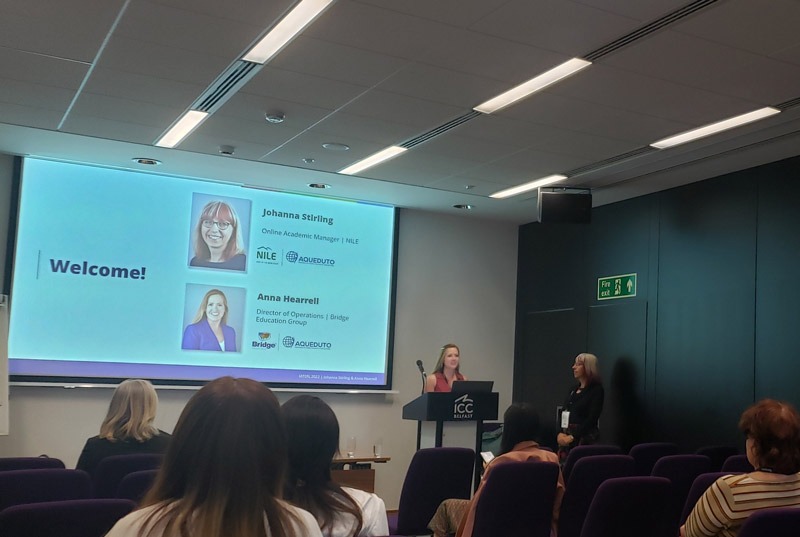
Still, there were a few grumblings of disagreement. With the pandemic becoming a regular part of life, some teachers spoke about how glad they were to be teaching in person again and how it really isn’t the same online.
Who Went to IATEFL? Who Didn’t?
IATEFL President, Gabriel Diaz Maggioli told me, “We have members in 100 countries, so we need to be diverse.”
IATEFL is, above all, international. There were attendees from all over Europe, Sub-Saharan Africa, Western Asia, and North and South America. It is clear that there was a concerted effort to be inclusive, especially for countries in the Global South and whose majority language is not English.
IATEFL President, Gabriel Diaz Maggioli told me, “We have members in 100 countries, so we need to be diverse.”
One way we saw this was through the IATEFL scholarship winners. Only two of the 23 winners were based in a majority English-speaking country, a clear sign that the conference acknowledges and wants to include teachers whose L1 isn’t English.
Rachel Tsateri, winner of the IATEFL Gill Stutridge First Time Speaker Scholarship expressed her gratitude for the scholarship and the opportunity to meet other teachers from around the world including “Africa, Canada and Korea. … [It was] a nice mix.”
Tsateri also encouraged more ELT professionals to apply. She said, “I wasn’t thinking about it until a friend encouraged me. … You never know, you might get the opportunity of a lifetime.”
Three out of four plenaries were presented by speakers whose L1 wasn’t English. Professor Štěpánek’s presentation about English as a Medium of Instruction (EMI) dealt in large part with accepting global English in academia rather than supporting native speakerism.
“Are you a spy? If not, you don’t need to worry about your accent.” – Dr. Štěpánek
“Are you a spy? If not, you don’t need to worry about your accent” Štěpánek quipped during his plenary session.
During the final plenary, teachers from Gaza spoke about their experiences teaching in an area of conflict. Although teachers from areas of conflict were far from the majority of attendees, IATEFL clearly made an effort to include these teachers despite the difficulties of getting anyone out of conflict areas and into the UK.
There were some notably absent groups. Few attendees came from Eastern Asia, save a handful of volunteer Chinese students studying at a local UK university. Southeast Asia was similarly not well represented.
Most participants seemed to be either part of academia, a major publisher, or a part of an organization like the British Council. International House, Bridge Education Group, and NILE had exhibition booths alongside National Geographic and Macmillan.
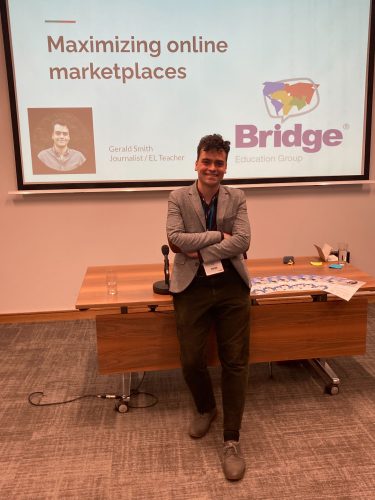
IELTS Global Account Manager, Ashleigh Bodell was thrilled with the event. “There is a huge element of collaboration going on. There’s a dialogue, and we haven’t had dialogues for a couple of years.”
Not many participants were teachers from language schools. This is probably due to COVID and the economic issues facing UK language schools as well as others around the world. Teachers without the support of a school or another organization are very unlikely to go to something like IATEFL.
Freelance EL teachers seemed more likely to attend than language school teachers.
It can be expensive, and there’s a huge opportunity cost for them. As an EL teacher myself, I couldn’t help but think about how for the week of IATEFL, I was effectively losing the money I would normally gain from teaching classes. Another possible issue for language schools and online teachers would be the content of the academic sessions, which were generally more academic than practical workshops.
It definitely has been more difficult for EL teachers to go to events like IATEFL when their jobs are so unstable. Rachel Tsateri told me, “I wouldn’t have come if it wouldn’t have been for the scholarship…I’ve been unemployed for a long time and Belfast is a long trip. I’m really grateful for the scholarship.”
Interestingly, freelance EL teachers seemed more likely to attend than language school teachers. Perhaps freelancers have more to gain from networking and upskilling at events like IATEFL than language school teachers who have a somewhat stable income that isn’t increased by upskilling or networking. UK language schools don’t appear to have tried to be represented at the event.
Bridge Education Group was one of the few EdTech companies to attend this year, along with Guided e-Learning and NILE Online. Others like Preply or Duolingo were absent from IATEFL. I met with one representative from Busuu, but seemingly all other tutor marketplaces and online English language platforms stayed home.
Since IATEFL is such an international organization, I wondered why the conference always took place in the UK. There are more affordable locations with large ELT industries around the world like Poland, Brazil and Japan. Holding a conference outside of the UK could also make it a lot easier for international teachers to attend.
I asked President Maggioli about this and he said, “it’s something that’s been brought up over and over again, but there are concerns with insurance.”
“And don’t forget, we’re a charity bound by UK law. We need to comply with the legal requirements here… We offer teachers an association, but at its core, [IATEFL] is a charity.”
“But [being in the UK] is also one of the draws that IATEFL has. Many teachers want to come to the UK to experience the culture in the flesh.”
Why Go to IATEFL?
“We all meet on a level playing field…We’re all in this together” – Jeremy Harmer
I spoke to hundreds of people during IATEFL, and people couldn’t stop expressing how nice it was to meet new and old friends face-to-face. For those who attended IATEFL for years, the atmosphere was not unlike a high school reunion.
Dr. Nayr Ibrahim told me “It’s wonderful to meet up with old friends… I’ve missed that for the past two years.”
ELT writer and musician, Jeremy Harmer told me, “Whether people are from Bangladesh, from Peru, it’s just really nice to see people again.”
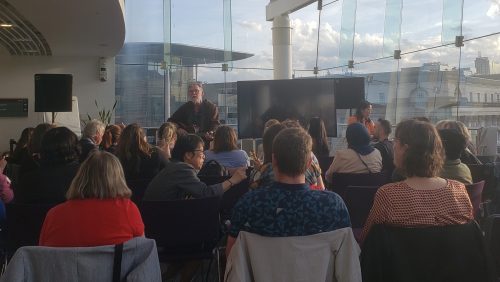
“We all meet on a level playing field,” he added, “I mean you’ve got authors and people who’re well known, but there’s something about this event which levels people up or down. We’re all in this together.”
For others who were attending for the first time like myself, the conference was a lot more like Comic-Con, except no one was dressed as Batman (unfortunately), and fans didn’t jostle around Ryan Reynolds but Adrian Tennant and Jeremy Harmer instead.
Shilipa Pulapaka, a freelance teacher, coach and content writer from London said, “I felt I wanted to do something to spruce up my routine a little bit. … I really like meeting people from all over the world.”
James Fadidac, a teacher from Cameroon and a Hornby Trust member, remarked that the conference hosted a “great variety of topics to help the evolution of a teacher.” He further reported that the conference was “mind-blowing and much larger than expected.”
I felt IATEFL also helped me grow as a teacher and refocus on some ways of teaching I haven’t used or thought about since my teacher training back in 2020. Gabriel Diaz Maggioli’s talk on teaching reading reminded me that I shouldn’t just teach reading like how a book has it set out; I should explore extensive reading and let my students decide what and when to read. There are more meaningful questions than the ones provided in a premade activity.
A talk on mediated learning by National Geographic reminded me about the importance of setting a context for my activities rather than just having students relay information for no apparent purpose.
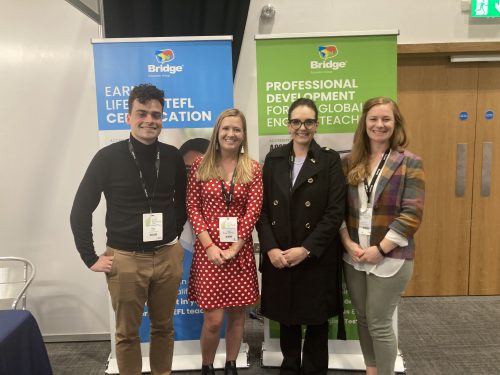
Still, there were some problems with the academic sessions. Oftentimes, they felt too academic. For the many professors and university lecturers, these sessions were fascinating and probably particularly useful for staying in the ELT loop. However, for many freelance and language school teachers, these academic sessions felt out of touch with our classrooms and our students even if they were based on important research.
As a teacher with a few years of experience, Shilipa said, “Things I didn’t enjoy were things I already know,” but the conference inspired her to think more about writing articles and teaching materials.
Bridge presented twice at IATEFL this year. I presented a talk on how to stand out on tutor marketplaces. With a light and supportive atmosphere, Teachers discussed the daily challenges they face online. Anna Hearell, as previously mentioned, gave her insightful talk on online teacher training and education.
IATEFL’s 16 Special Interest Groups (SIGs) were one of the best parts of IATEFL. They offer helpful communities for teachers of almost any background. In particular, the BESIG (Business English) attracted many with its friendliness and its promise to help members become successful. The Young Learner Teaching SIG was vibrant and supportive. Finally, the Teacher Trainer SIG gave insights into how to be a better educator of teachers.
Not everything was perfect. One issue was the career fair which had few jobs advertised, and all were in-person teaching positions. It could have been better adapted to the times and the international crowd, as many teachers want to work online rather than pack up and travel around the world. However, there were some useful ‘how to’ sessions like “how to move from a teacher to a teacher trainer” or “how to teach online” plus a CV Clinic that offered useful guidance to attendees.
Final Thoughts
We’re still here.
Overall, networking was the main reason attendees came to IATEFL and, in this area, the conference surpassed expectations. Face-to-face conversations, while mildly awkward during the first morning, quickly developed organically. Networking at the conference was natural, helpful and fun.
In the end, the biggest highlight for me had nothing to do with networking, upskilling or lectures. The best part was the music night put on by Jeremy Harmer and Judy Wong.
It was casual, filled with snafus like not having a proper sound system let alone a decent mic, but the event had heart. Buzzed on free prosecco and beer, teachers from all over the world sang together celebrating the fact we’re still here.
After two years of a pandemic that changed the industry so much, we’re still here. After many of us lost our jobs and felt like leaving the industry altogether, we’re still here. After some of us braved classrooms without an internet connection or even electricity while others survived war zones, we’re still here. Some of us are going right back to those same conditions, but, for that moment, we could forget about it all, come together and sing.
Additional Resources:
Never stop learning! Check out Continuous Professional Development (CPD) opportunities at Bridge!
Learn more about IATEFL: https://bridge.edu/tefl/blog/iatefl-and-tesol-titans-of-elt-part-one/
Register for the upcoming BridgeUniverse online Summit now!





